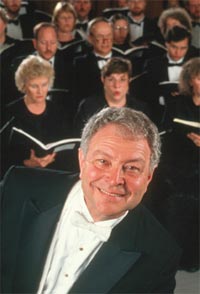
Vance George
When Vance George, conductor of the San Francisco Symphony Chorus, conducts J.S. Bach's "St. John's Passion" at Goshen College on April 4 and 6, he will be continuing a relationship with Bach that started in adolescence. "As a 12-year-old kid I earned some money planting mint, and bought a metronome and the Bach 'Two-part Inventions,'" said George from his home in San Francisco. "I've just kept working at performing Bach all my life." The performance of "St. John Passion" will be an exciting one and will also link George to his past. Professor Emerita of Music Mary Oyer will conduct the audience in singing the Bach chorales interspersed in the work, reminiscent of the hymn sings that George said were some of his fondest college memories. He still sings hymns every week at Grace Cathedral in San Francisco. The three-time Grammy winner has conducted all of Bach's major works. In January he prepared a chorus of college choir directors for a performance of the storied "B-minor Mass" at Carnegie Hall in New York City. As expected, his chorus received rave reviews - Newsday of New York heralded the chorus as "avid and burnished…it had George's palm prints all over it." George said he began developing the nuances of his unique musical imprint at Goshen College, under the tutelage of Oyer. "Being in her courses was really something," said George. "They are really the basis of how I work today." From Oyer, George learned to appreciate musical form and developed an eye for detail. Then he began to sensing how to translate form into musical shape. "I remember sitting in a class - I think it was one of the very first classes I can recall - and she was playing and singing from Bartok's 'Microcosomos,'" George said. "I was moved to tears. I wouldn't have been able, then, to figure out why; but I know now that it was her depth of musicianship that moved me." Oyer recalls George as revolutionary in Goshen's music scene. "He was one of the most creative persons I've ever had as a student," she said. "I learned a lot from him." Most significantly, said Oyer, he conducted the first opera at Goshen College - a performance of Menotti's "Amahl and the Night Visitors." Said Oyer, "It was the right time for a student like him to come along. We weren't allowed to do opera in those days." It was also a formative experience for George - one that illuminated a vocational path in conducting. George, who grew up near Napannee, Ind., came to Goshen as a 17-year-old to study music. "I was so naïve," he said. "I thought I could be a concert pianist and an opera singer. But what did I know?" Despite his lofty ambitions, George said he was not "a stellar whiz kid." In fact, he was still learning to read music when he entered college. But he learned fast, and worked hard. George graduated in 1955 with a degree in music, having completed a double major in piano and voice. His spiritual life also began to take shape during his years at Goshen. "Certainly my spiritual nature was enlivened and engaged there," he said. "My commitment and attitude toward peace and spirituality was something that was deeply influenced at Goshen."  Two
years after graduating from Goshen, during the Korean War, he spent
three years in alternative service in India, teaching music with
GC music faculty Lon and Kathryn Sherer at the Woodstock School.
He returned to northern Indiana and taught for two years at Northside
Junior High School (Elkhart, Ind.) When he decided to pursue a postgraduate
degree at Indiana University, he intended to focus on middle school
education, but chose to study conducting instead. Two
years after graduating from Goshen, during the Korean War, he spent
three years in alternative service in India, teaching music with
GC music faculty Lon and Kathryn Sherer at the Woodstock School.
He returned to northern Indiana and taught for two years at Northside
Junior High School (Elkhart, Ind.) When he decided to pursue a postgraduate
degree at Indiana University, he intended to focus on middle school
education, but chose to study conducting instead. Following graduate school, George taught at University of Wisconsin at Madison and then spent seven years as assistant conductor with the Cleveland Symphony until he was recommended for the choral conducting post in San Francisco. This year, he celebrates his twentieth season with the San Francisco Symphony Chorus. Under his tenure, the chorus has been awarded three Grammys and is lauded as one of the world's finest. George knows that his résumé doesn't read like that of a typical musician in his position - he didn't grow up in New York City or attend the Julliard School of Music as might be expected for someone of his distinction. Instead, George stayed in Indiana for all of his training. But for choral conductors, he said, that isn't unusual. "Many, many choral conductors and a very strong choral movement is found in the Midwest," he said, "and more so than the East and the West. I don't know why." The door to the music world may be hard to open, George said, but in order to succeed, "you must persevere." As a young conductor, George deliberately sought out great maestros, such as Robert Shaw and Margaret Hillis, and spent countless hours watching them rehearse choirs and orchestras, absorbing their techniques. The most important advice to anyone - in any career - is to follow your heart, he said. "It's by doing and by being musically and spiritually honest with yourself. Your heart knows and will tell you," he said. The San Francisco Symphony Chorus is comprised mainly of volunteers who sing because it brings them joy. For George, this choice represents the best of musical experiences. "It doesn't really matter where you're making music," he said. "It can be very, very humble and simple music making. But if it brings joy to you and to others, then you're on the right path." |
| Top of page |


